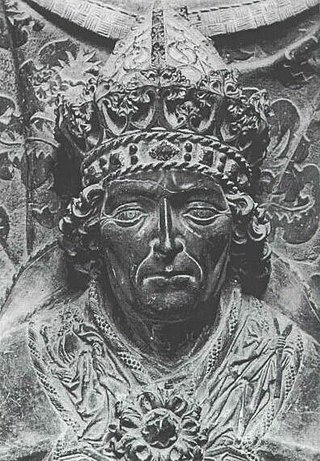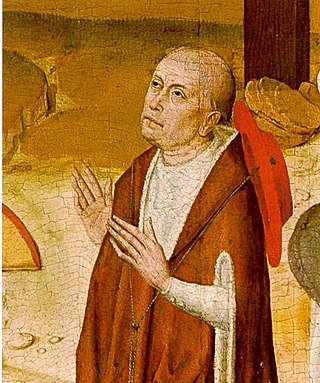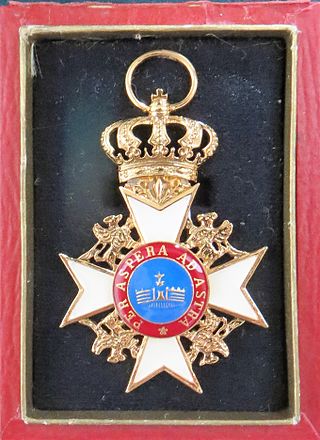Related Research Articles

Louis IV, called the Bavarian, was King of the Romans from 1314, King of Italy from 1327, and Holy Roman Emperor from 1328 until his death in 1347.

The House of Wittelsbach is a former Bavarian dynasty, with branches that have ruled over territories including the Electorate of Bavaria, the Electoral Palatinate, the Electorate of Cologne, Holland, Zeeland, Sweden, Denmark, Norway, Hungary, Bohemia, and Greece. Their ancestral lands of Bavaria and the Palatinate were prince-electorates, and the family had three of its members elected emperors and kings of the Holy Roman Empire. They ruled over the Kingdom of Bavaria which was created in 1805 and continued to exist until 1918.

Charles IV, also known as Charles of Luxembourg, born Wenceslaus, was Holy Roman Emperor from 1355 until his death in 1378. He was elected King of Germany in 1346 and became King of Bohemia that same year. He was a member of the House of Luxembourg from his father's side and the Bohemian House of Přemyslid from his mother's side; he emphasized the latter due to his lifelong affinity for the Bohemian side of his inheritance, and also because his direct ancestors in the Přemyslid line included two saints.
Year 1447 (MCDXLVII) was a common year starting on Sunday of the Julian calendar.
An heir presumptive is the person entitled to inherit a throne, peerage, or other hereditary honour, but whose position can be displaced by the birth of a person with a better claim to the position in question. This is in contrast to an heir apparent, whose claim on the position cannot be displaced in this manner.

Nicholas of Cusa, also referred to as Nicholas of Kues and Nicolaus Cusanus, was a German Catholic cardinal and polymath active as a philosopher, theologian, jurist, mathematician and astronomer. One of the first German proponents of Renaissance humanism, he made spiritual and political contributions in European history. A notable example of this is his mystical or spiritual writings on "learned ignorance," as well as his participation in power struggles between Rome and the German states of the Holy Roman Empire.

Maximilian I Joseph was Duke of Zweibrücken from 1795 to 1799, prince-elector of Bavaria from 1799 to 1806, then King of Bavaria from 1806 to 1825. He was a member of the House of Palatinate-Birkenfeld-Zweibrücken, a branch of the House of Wittelsbach.

Margaret II of Avesnes was Countess of Hainaut and Countess of Holland from 1345 to 1356. She was Holy Roman Empress and Queen of Germany by marriage to Holy Roman Emperor Louis IV the Bavarian.

The Order of St. Andrew the Apostle the First-Called is the highest order conferred by both the Russian Imperial Family and by the Russian Federation . Established as the first and highest order of chivalry of the Russian Tsardom and the Russian Empire in 1698, it was removed from the honours system under the USSR before being re-established as the top Russian civil and military order in 1998.

The Order of the Redeemer, also known as the Order of the Saviour, is an order of merit of Greece. The Order of the Redeemer is the oldest and highest decoration awarded by the modern Greek state.

Albert I, Duke of Lower Bavaria, was a feudal ruler of the counties of Holland, Hainaut, and Zeeland in the Low Countries. Additionally, he held a portion of the Bavarian province of Straubing, his Bavarian ducal line's appanage and seat, Lower Bavaria.
Stephen I. was the duke of Lower Bavaria from 1290 until 1310 as co-regnant of his older brothers Otto III and Louis III.
Henry XIV, Duke of Bavaria, was Duke of Lower Bavaria.

The House and Merit Order of Duke Peter Frederick Louis or proper German Oldenburg House and Merit Order of Duke Peter Frederick Louis was a civil and military order of the Grand Duchy of Oldenburg, a member state of the German Empire. The order was founded by Grand Duke Augustus of Oldenburg on 27 November 1838, to honor his father, Peter Frederick Louis of Oldenburg. It became obsolete in 1918 after the abdication of the last grand duke.
Giovanni Andrea Bussi (1417–1475), also Giovan de' Bussi or Joannes Andreae, was an Italian Renaissance humanist and the Bishop of Aleria. He was a major editor of classical texts and produced many incunabular editiones principes. In his hands the preface was expanded from its former role as a private letter to a patron, to become a public lecture, and at times a bully pulpit.

The Royal Order of Saint Hubert, or sometimes is a Roman Catholic dynastic order of knighthood founded in 1444 or 1445 by Gerhard VII, Duke of Jülich-Berg. He sought to commemorate his victory over the House of Egmond at the Battle of Linnich on 3 November, which is Saint Hubert's day.

The House Order of the Wendish Crown is a dynastic order that was jointly instituted on 12 May 1864 by Grand Duke Friedrich Franz II of Mecklenburg-Schwerin and Grand Duke Friedrich Wilhelm of Mecklenburg-Strelitz. It is the oldest and most senior order of the House of Mecklenburg.
References
- ↑ Cusanus, Nicholas. "De Ludo Globi" (PDF). Retrieved 22 April 2018.